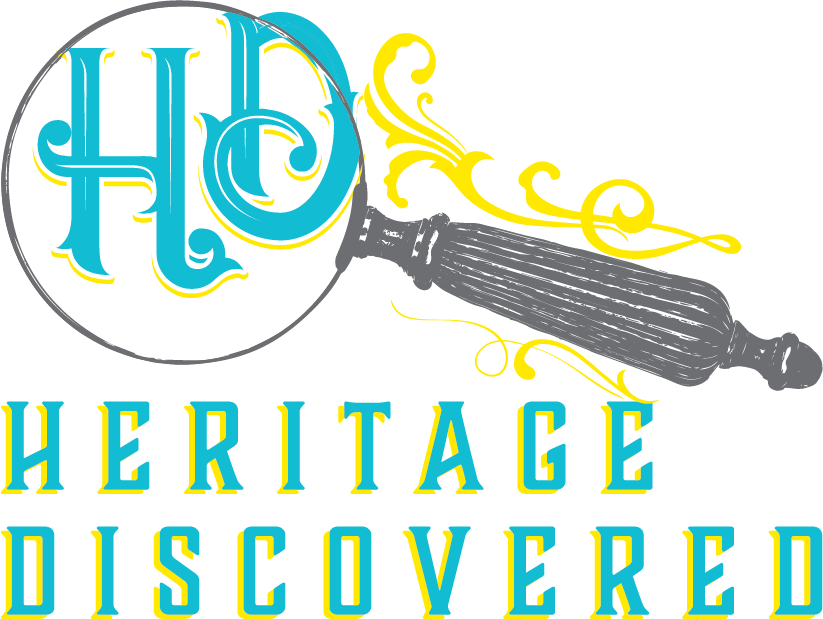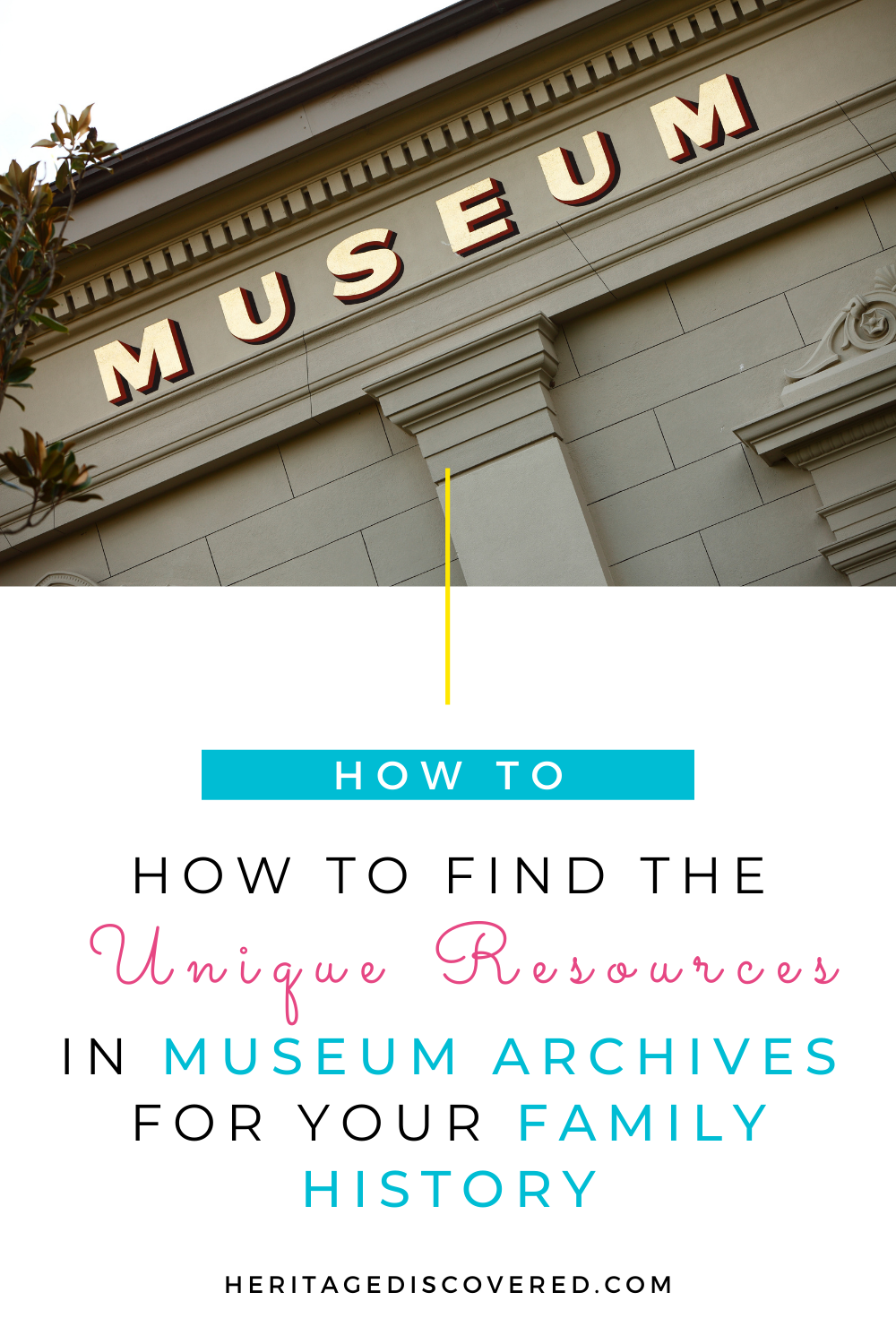Museum Archives: How To Use This Unique Resource In Your Research
This post may have affiliate links, which means I may receive commissions if you choose to purchase through links I provide (at no extra cost to you). All opinions remain my own.
Sad fact: while it’s hard to get an accurate number, it’s estimated that only about 10% of genealogy records are online.
So as much as I love online research as much as the next person, offline research is a must if you want to keep adding facts and stories to your family tree.
Three common places to do in-person searching are courthouses, libraries, and archives. All have unique and valuable records for our family history.
But guess what? Museums have genealogy records, too!
In this article, I’ll go over how to use museums for your genealogy research.
Why you should use museum archives for your family history
For a long time, I didn’t consider using museums for my family tree research. I love them but thought of them as places for artwork and artifacts.
But after visiting some specialized repositories, like the Museum of Performance and Design, I realized these unique archives can have genealogical treasures inside.
You can find items related to your ancestors, as well as materials that help you gain a better understanding of how they lived.
And knowing how they lived adds more richness and stories to your family history!
Related posts:
How the Digital Public Library of America Can Power Up Your Genealogy Research
Everything You Need to Know About Using Home Sources
7 Simple Steps To Creating A Genealogy Timeline (And Why You Need One)
Types of museums to use in your genealogy research
There are a million and one kinds of museums out there. And depending on where your ancestor lived and other traits about them, you can uncover genealogical information in them.
A couple of broad categories of types of museums to use for your family history are:
1) Locality-related museums. These focus on the history of a specific town, region, or state, like the Chicago History Museum.
In fact, every state has a museum (which may be combined with the state’s historical society).
There are also museums for very specific, small localities like the Tenement Museum in New York, where you can see how your immigrant ancestors lived.
Regional museums collect and showcase the history and culture of that place, including artifacts, photographs, and other items connected to the area and its people.
Lowell Mill Museum. Credit: Daderot at English Wikipedia, CC0, via Wikimedia Commons
2) Museums focused on a specific topic. These topics can run the gamut of nearly everything you can think of. Some of the most helpful for genealogy are those related to occupations and industries, and organizations.
For example, the Iowa Masonic Library and Museums has one of the largest collections of Masonic records in the country.
If your ancestor worked for the railroads, you can check out the California State Railroad Museum. If they worked in the aviation industry, you may discover them in the Louis A. Turpen Aviation Museum.
If your ancestor served in the military, there may be a repository for that branch or a war they served in.
There are also ones for many other industries like coal mining, sports, farming, and the circus! Whatever type of occupation your ancestors had, check to see if there is a museum related to it.
Other important genres are ethnic and religious museums. These highlight and preserve the history and culture of specific ethnic or religious groups. These institutions will often have archival documents open for research in which you just might come across one of your ancestors.
Examples include:
Ethnic museums exist across the US and may not be in the region your ancestors lived, so look for them around the country.
Once you know the types of archives you want to research in, get prepared with a simple archive visit checklist.
Related posts:
7 Tips To Help You Create A Successful Genealogy Research Plan
Why Isn’t My Ancestor in the Census?
How to Strengthen Your Cemetery Research Skills to Find More Clues
Types of records in museums to use for genealogy
What kinds of genealogical records can you discover in museum archives?
While every collection is going to be different, some record types you may come across are:
Photographs
Correspondence
Diaries
Scrapbooks
Sermons
Speeches
Scripts
Financial records
Meeting minutes
Membership lists
Oral histories
Autograph books
Military records
Newspapers
Vertical files
Related posts:
4 Fun And Easy Ways To Use Flickr For Genealogy
How to Find and Use Hidden Clues in Obituaries
Why I Love The National Library of Ireland Parish Registers Collection And Why You Will Too
How to get access to the museum records
Your first step is to find the repositories that may have materials related to your family.
See what local, regional, and state museums are in the place your relatives lived. Don’t forget to look for specific neighborhoods, especially if they lived in a city, like the Tenement Museum I mentioned earlier.
Next, search for those connected to your ancestor’s ethnicity, occupation, or hobbies.
Explore their websites for pages on resources, research, special collections, or archives. This is where you’ll learn about what materials they have. Sometimes these links are obvious, but sometimes you have to dig around for them.
In some cases, they’ll have an online catalog where you can search to see if they have anything of interest to you. You may also see finding aids, where you can see detailed descriptions of their holdings. These can have a name index of the people included in them.
Don’t be afraid to reach out to staff by email or a contact form to see if they have any materials relevant to your family. Sometimes it’s not obvious, even if there’s an online catalog to search.
Let the staff know about who you’re looking for – the person, the time, and anything specific you may want to find, like photos.
Don’t share your ancestor’s whole life story with them! Just share the basic facts and see if they can guide you toward any items that might benefit what you’re working on.
Also, archivists are usually familiar with what’s available in other organizations. Tap into their knowledge to find other repositories that can help you.
If they do have items you’d like to see in person, check out the website or ask them what their research policy is.
A lot of museums do allow people to use their archives, but you need an appointment. Besides an appointment, most also have rules around visiting, including whether you can bring electronics, usage fees, and if you have to check in your bag.
Check their website for any rules and prepare before you go so you don’t have any surprises!
Once you’re there, you can also chat with any docents, who are very familiar with the collections and can share more information with you.
Like any visit to an archive or library, know what you want before you go so you don’t waste any valuable time, especially if you’re traveling to get there. Make a list of what items you need and be sure to request them beforehand so they’re ready for you when you arrive.
Sometimes it’s not possible to visit in person. If you can’t get there yourself, contact the staff or check their website to see if they will do lookups for you. Some offer this as a service for a fee.
White County Courthouse Museum, Cleveland, GA. Credit: Thomson200, CC0, via Wikimedia Commons
Museum digital collections
Okay, I know I said that offline research is important (and it is) but be sure to also check for any virtual exhibits on their website.
Some organizations are now digitizing their collections. You may get lucky and see your ancestor in one of the virtual exhibits. If so, they may have even more about your family in their vaults.
Related posts:
How Setting Genealogy Goals Makes You A Better Researcher
6 Common Genealogy Mistakes And How To Avoid Them
How and Why to Research Your Collateral Ancestors
Solve Your Genealogy Brick Wall: Review and Analyze Your Research
Final thoughts
Museums are an important but overlooked resource for your family history research. Like other archives, they have many unique items that can enhance your family history. There are many types that you can find your ancestors in, from ethnic museums to local history museums to ones on their religion.
Once you identify a repository that may have records about your family, reach out to them to see what they have, and prepare ahead of time for your archives visit so you can get the most out of your research time.




